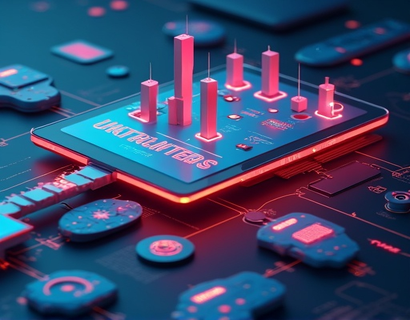Crypto and AI: Unlocking Enhanced Digital Experiences for App Ecosystems
The convergence of cryptocurrency and artificial intelligence (AI) is revolutionizing the digital landscape, creating unprecedented opportunities for innovation and enhanced user experiences. As technology continues to evolve, the integration of these two powerful forces is reshaping how applications function, how users interact with them, and how businesses operate. This article delves into the transformative impact of merging cryptocurrency and AI, exploring the implications for app ecosystems and providing insights for tech professionals and early adopters.
The Rise of Cryptocurrency and AI
Cryptocurrency has emerged as a disruptive force in the financial sector, offering decentralized and secure transactions that challenge traditional banking systems. Bitcoin, Ethereum, and countless altcoins have paved the way for a new era of digital finance, characterized by transparency, security, and accessibility. On the other hand, AI has made significant strides in recent years, enabling machines to learn from data, make decisions, and automate processes. The combination of these technologies is not just a trend; it represents a fundamental shift in how we perceive and interact with digital solutions.
Transformative Impact on Digital Experiences
The integration of cryptocurrency and AI is enhancing digital experiences in several key ways:
Personalization
AI algorithms analyze user behavior and preferences, allowing applications to deliver personalized content and recommendations. When combined with cryptocurrency, users can receive tailored financial advice, investment opportunities, and product suggestions based on their unique profiles.
Security and Trust
Blockchain technology, the backbone of cryptocurrency, provides a secure and transparent way to store and transfer data. AI can enhance this security by identifying patterns and anomalies in transaction data, helping to prevent fraud and ensuring user trust in digital platforms.
Efficiency and Automation
AI-driven automation streamlines processes, reducing the time and effort required for tasks such as customer service, transaction processing, and data analysis. Cryptocurrency transactions can be executed quickly and efficiently, further enhancing the overall user experience.
Decentralized Applications (dApps)
The rise of decentralized applications is a direct result of the integration of blockchain and AI. These applications operate on a peer-to-peer network, eliminating the need for intermediaries and providing users with greater control over their data and transactions.
Innovative Use Cases
The fusion of cryptocurrency and AI has led to numerous innovative use cases across various industries:
Finance and Investment
AI-powered trading algorithms analyze market trends and execute trades in real-time, maximizing profits for investors. Cryptocurrency exchanges leverage AI to enhance security, detect fraudulent activities, and provide personalized trading experiences.
Supply Chain Management
Blockchain technology ensures transparency and traceability in supply chains, while AI optimizes logistics and inventory management. This combination enhances efficiency and reduces costs, benefiting both businesses and consumers.
Healthcare
AI algorithms analyze patient data to provide personalized treatment plans, while blockchain secures sensitive health information. Cryptocurrency can facilitate seamless payments for healthcare services, improving access and affordability.
Gaming and Entertainment
Blockchain-based gaming platforms allow players to earn cryptocurrency through gameplay, while AI enhances user experiences by personalizing game content and interactions. This creates a more engaging and rewarding environment for gamers.
Challenges and Considerations
While the integration of cryptocurrency and AI presents numerous opportunities, it also poses challenges that must be addressed:
Regulatory Compliance
The regulatory landscape for cryptocurrency is still evolving, and businesses must navigate complex legal frameworks to ensure compliance. This is particularly important for AI applications that handle sensitive data.
Data Privacy
As AI relies on vast amounts of data, ensuring user privacy is paramount. Blockchain technology can enhance data security, but businesses must implement robust measures to protect user information.
Technical Complexity
Integrating cryptocurrency and AI requires specialized knowledge and expertise. Organizations must invest in talent and resources to develop and maintain these advanced technologies.
Future Trends
The future of cryptocurrency and AI integration is promising, with several trends expected to shape the landscape:
Increased Adoption of Decentralized Finance (DeFi)
DeFi platforms are gaining traction, allowing users to access financial services without traditional intermediaries. AI will play a crucial role in optimizing these platforms, enhancing user experiences, and ensuring security.
Enhanced AI Capabilities
As AI technology continues to advance, its applications in cryptocurrency will expand. Improved algorithms will enable more accurate predictions, better risk management, and enhanced user personalization.
Interoperability Between Blockchains
The future will likely see greater interoperability between different blockchain networks, allowing for seamless transactions and data sharing. AI can facilitate this interoperability by analyzing and optimizing cross-chain interactions.
Focus on Sustainability
As concerns about the environmental impact of cryptocurrency mining grow, AI can help develop more sustainable practices. This includes optimizing energy consumption and identifying eco-friendly alternatives.
Conclusion
The merging of cryptocurrency and AI is unlocking enhanced digital experiences and driving innovation across various sectors. As these technologies continue to evolve, they will reshape how users interact with applications and how businesses operate. For tech professionals and early adopters, understanding the implications of this integration is crucial for leveraging these powerful tools to create value and foster growth. Embracing the potential of cryptocurrency and AI will not only enhance user experiences but also pave the way for a more innovative and efficient digital future.










































